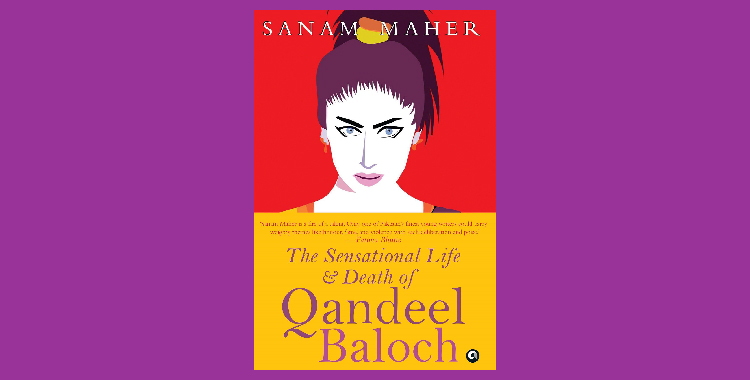Season 11 of Coke Studio Pakistan opened with the rendition of an acclaimed set of poems written by Allama Iqbal titled Shikwa and Jawab-e-Shikwa. Inspired by John Milton’s poems Paradise Lost and Paradise Regained, these are a set of two poems written in 1909 and 1913 respectively — one as a complaint to God and one as God’s response to the complainant. Although the central idea of the poem Shikwa was to complain to God about the state of Muslims, poetry isn’t poetry if interpreted in more than one vein. Therefore in the show, I find it very telling that some of the most powerful words of complaint are sung by a woman in a country that ranked at 143 out of the 144 countries in the gender gap index as reported by the World Economic Forum (WEF) in 2017, has disposed 345 infant girls inside rubbish dumps since 2017, and is known to kill at least 1000 women in the name of honour every year.
In her book, The Sensational Life and Death of Qandeel Baloch, Karachi-based journalist Sanam Meher draws the portrait of a young Pakistani woman murdered by her brother in the name of honour in July 2016. Qandeel’s rising popularity in Pakistan as a self-made internet celebrity, her appearance on national talk shows, and her “indecent” videos on Facebook and Twitter were tarnishing the name of their family, her brother believed. One night when she was visiting her parents’ home, he drugged the family into a deep sleep and suffocated his sister to death.
The book opens with a fast-paced, wonderfully written chapter describing the morning of Qandeel’s death and the breaking news reaching media outlets. Told entirely in present tense, the compelling narrative of Sanam’s book doesn’t read like non-fiction. When Sanam takes us to Shah Sadar Din, the village where Qandeel was born, it feels like an elaborate frame of a Bollywood movie replete with scenes of snaking brown rivers, thermal power stations, brick kilns, and farming land. “It will be the first time you have seen only a man in an ad for a washing detergent,” she writes and then describes a place so inherently misogynistic that one suspects of having entered an alternate universe where men have never considered women human. Someone in the village tells Sanam that it is commonplace to kill girls in Shah Sadar Din and “…every second or fourth day some girl is killed and thrown in the river.” If no one told you the location of this place, you might as well be somewhere in North Africa or Haryana, India.
Named Fouzia Azeem at birth, Qandeel renamed herself to mean “light” after she left behind an abusive husband, a child she birthed, and a suffocating life she was forced to lead because her parents knew no other to give her. She worked odd jobs until she found herself making money by walking small-time ramps and doing small-budget music videos. Wanting more, she turned to the Internet and carved herself an identity on the Internet becoming a self-made celebrity. She gained (in)fame after posting suggestive videos of herself in “revealing” clothes on Facebook and Twitter. In a short time, she amassed a huge following that was split down the middle — amazed at her courage or deeply critical of her entire existence — no matter the case, they watched her in either awe or disgust as she went from one “scandalous” video to another, one shocking public statement to the next. Sanam has mentioned she hesitated at using the word “Sensational” in the title of the book, but honestly, there was no other way to describe it. Qandeel was a fire that light up Pakistan’s social media in a way they had never seen before. She was a stunningly good-looking woman, open about her sexuality online and showing off more skin than is deemed acceptable in Pakistani society.
The Western media called Qandeel Pakistan’s Kim Kardashian but as Sanam has mentioned in the book, she was far from it. Qandeel wasn’t protected by the class and the money afforded by Kim nor did she have the privilege of impeccable English or even an army of artists and managers telling her how to dress and how to behave online. Everything Qandeel did was unpolished, raw, and unfiltered to build an image of mystery and shock. Her marriage proposal to Imran Khan, her inappropriate pictures with Mufti Qavi, and her spat on Pakistan talk shows made her all the more alluring for doing and saying things that shocked the conservative Pakistani society. It seems to me that she was all the things people wanted but didn’t have the courage to be. As it turns out in such scenarios, they had to vilify her for being what she was and punish her in case they found in themselves the want but not the courage to be brazen.
It is this woman’s life that Sanam threads together and in the process, she draws up a mirror to the nation that is Pakistan, its treatment of women, and their cumulative upbringing. Placing Qandeel at the centre of the narrative, Sanam effortlessly weaves the contributions of supplementary characters making them fit snugly into the whole picture. A major chunk of the allure of the book belongs to the girls who leave homes to become models, the chai-wala whose picture “broke the Internet” and how his life tumbled after the media got hold of him, the tenacious life of Nighat Dad who is the founder of Pakistan’s first cybercrime helpline, the Digital Rights Foundation (DRF), and even that of Mufti Qavi the liberal cleric who shot to fame with his modern interpretation of Islam and his dismissal to the shadows. In these stories Sanam puts focus on the courage of people living in a deeply troubled nation. She did all this and more to deconstruct how Qandeel became a feminist icon attracting hateful fascination because loving her was out of the question.
While reading the book, one tends to get swayed by its excellent narration, but once I pulled myself away from it and read more about Qandeel on the internet, on Pakistani sites, it seems like very little onus was placed on the Pakistani media’s contribution to her murder. If you read some of the interviews, they seem designed to manufacture hysteria around Qandeel, to take pleasure in the forthright things she said and to make it seem like she was being profane. Because how else do you explain the sensationalism if it weren’t an exaggerated reaction to something seemingly innocuous? If you had to put Qandeel in a different society, she would have passed off as just another girl on the Internet. One way or another, it seems that everything written in Pakistan about Qandeel reeks of a sense of vicious pleasure either because she’s dead or because now she can be used as a vehicle for feminist movements.
If it takes a village to raise a child, it also takes a village to condone the murder of the child. Sure her death mobilised the passing of The Anti-Honour Killing Laws (Criminal Amendment Bill) and the Anti-Rape Laws (Criminal Amendment Bill) in Pakistan and the closing of a loophole in the Honour Killing Law that pardoned killers if the family forgave them. Sure, Pakistan’s progressive society mourned her in their capacity and as soon as they did it publicly they received threats and feared for their lives. Sure, all this is well and good. But how many Qandeels must die before violence against women is met with widespread repulsion instead of relief?
The answer, as it turns out, is many, many more. Tara Fares, an Iraqi woman who shot to fame on Instagram with her stylish pictures was shot in September 2018. Tara’s story is eerily similar to Qandeel’s — a young girl married off to a man who abused her, a child left behind, breaking free and becoming a woman of her own mind who used social media to assert her individuality. Both Qandeel and Tara were stunningly beautiful women whose faces on social media were more than just for purposes of aesthetic. Both of them owned their lives, made their money, and did not shy away from looking straight into the camera with a look that said, “I am here. Look at me.”
All patriarchal and misogynistic societies are obsessed with the erasure of women be it in the form of the ghoonghat or the hijab or if neither, in their attempts to police the behaviour of women so that they don’t bring alleged shame to the family. Shame could mean anything from choosing a partner to date or marry, wearing clothes deemed indecent, or even the refusal to marry forcibly. It is estimated that 5000 women are killed every year in the name of honour. Out of these 1000 are killed in Pakistan and 1000 in India. The rest spread across the globe and these numbers are not conclusive due to the nature of honour killings being pardoned or hidden by the family for the fear of society censure. Until the 1980s, Italy had a law that justified murder in the name of “honour” and Pakistan has just tightened the screws on a loophole in their honour killing law in 2016 after Qandeel’s murder. Honour killing dates back to 6000 BCE and violence against women is ingrained in men’s DNA with as many as three women being killed every day in present-day America by their current/former partners.
In the introduction, Sanam mentions that the book is designed to make people come up with more questions after reading it. To explain Qandeel, she says, is not her goal. The meteoric rise of Qandeel’s (in)fame is attributed to Pakistan’s social media users. The cold-blooded murder is attributed to her brother. The structures that enabled these social media users and her brother to deeply hate a woman, to laud the courage of those who break social mores and then to justify her killing, are those of patriarchy and religion and the Pakistani media. TSLDQB is not only a story of a woman who wanted to own her life and sexuality in public but also the story of men who wanted to partake from it without any consequence to themselves. It the story of a society that killed a woman who put herself in the public glare and let go the public who came to watch.
In 2012, Mona Eltahawy an Egyptian-American journalist wrote a powerful essay titled, “Why Do They Hate Us?” about the broad strokes of misogyny across the Arab world and the subterranean hate men tend to harbour towards women using it to subjugate women under the pretext of gender, culture, and most notedly religion. Unfortunately, misogyny is not restricted to the Arab world and cuts across the globe with its enslaving noose that has men convinced that they own women and that, somehow, the conduct of the women in their lives is a barometer of how much respect men command in society. This is a masterstroke of absolving responsibility, consequence, and blame resulting in a system that works just fine.
Mona Eltahawy’s book Headscarves and Hymens: Why the Middle East Needs a Sexual Revolution is a biting manifesto against the patriarchy for all women cutting across all cultures. If you follow Mona on Twitter, you will know she’s a woman full of undeniable courage rallying for women’s rights and she doesn’t apologise for her anger. While reading The Sensational Life and Death of Qandeel Baloch, I thought of Mona often. The truth is that TSLDQB reads like a novel that can be made into a well thought out movie. It is slick and well-adjusted. It has its moments of despair and its moments of helplessness. The book is many things but it is not an angry book. And it’s a crying shame that it is not an angry book. It should have a seething undercurrent of rage running through its spine. Because like Mona says, “The most subversive thing a woman can do is talk about her life as if it really matters. It does.” Given that Sanam is writing about Qandeel’s life, I believe anger is important for it to be known that she mattered and her death wasn’t just an excuse or an awakening for Pakistan to change their archaic laws. Patriarchy will not be overthrown without rage, it will not be overthrown without a rallying cry of women who stand up and say, “I am here. Look at me.”
****
The Sensational Life & Death of Qandeel Baloch
by Sanam Maher
Hardcover, First Edition, 272 pages
Published in 2018 by Aleph Book Company (India)





